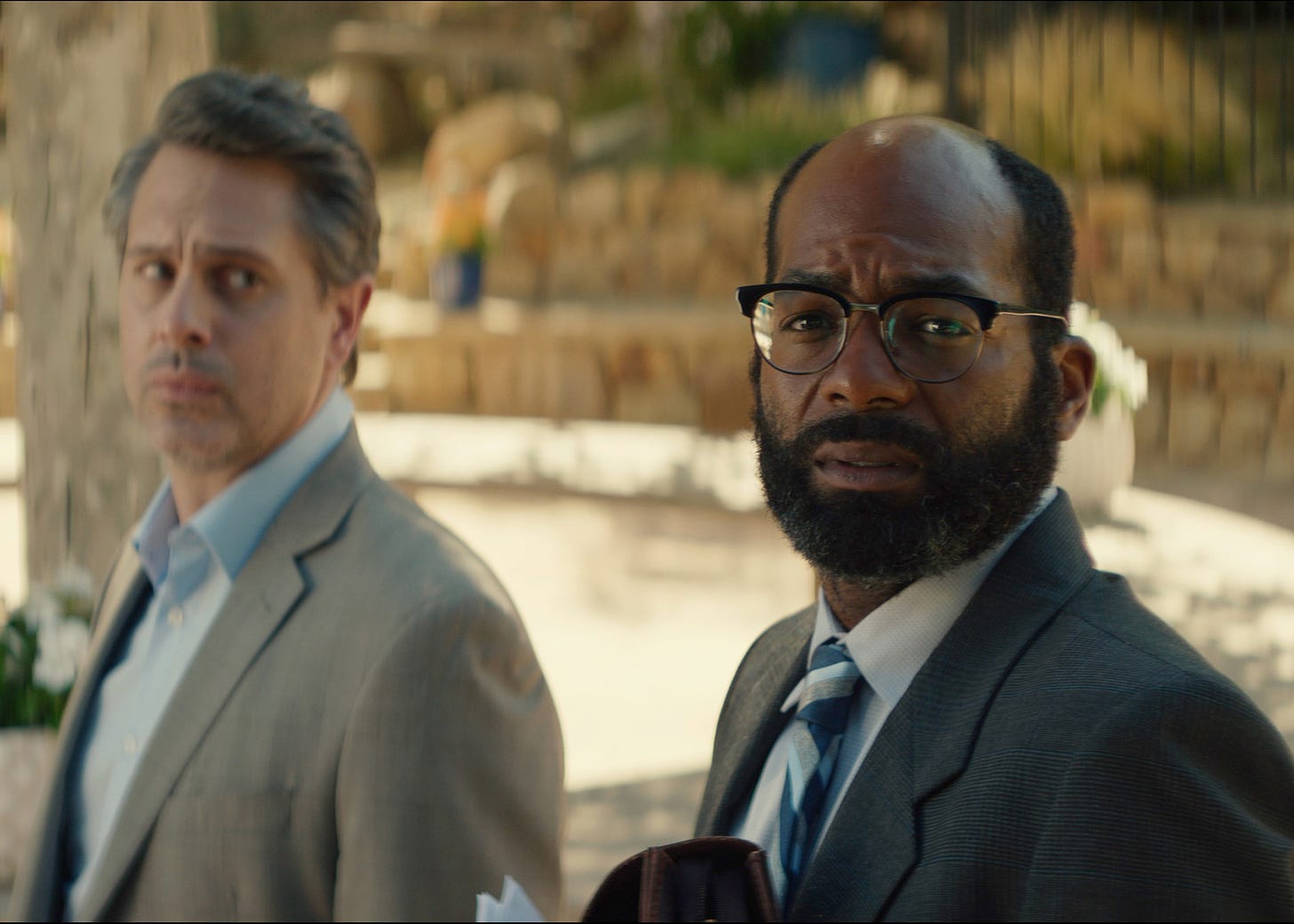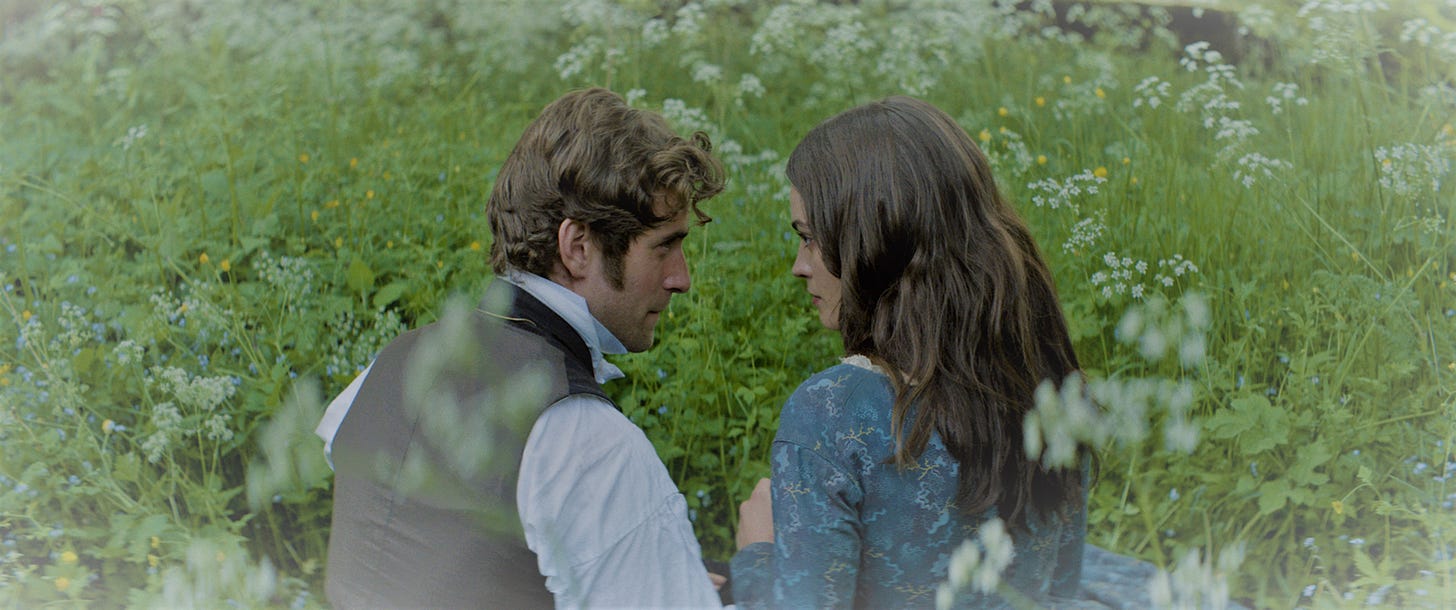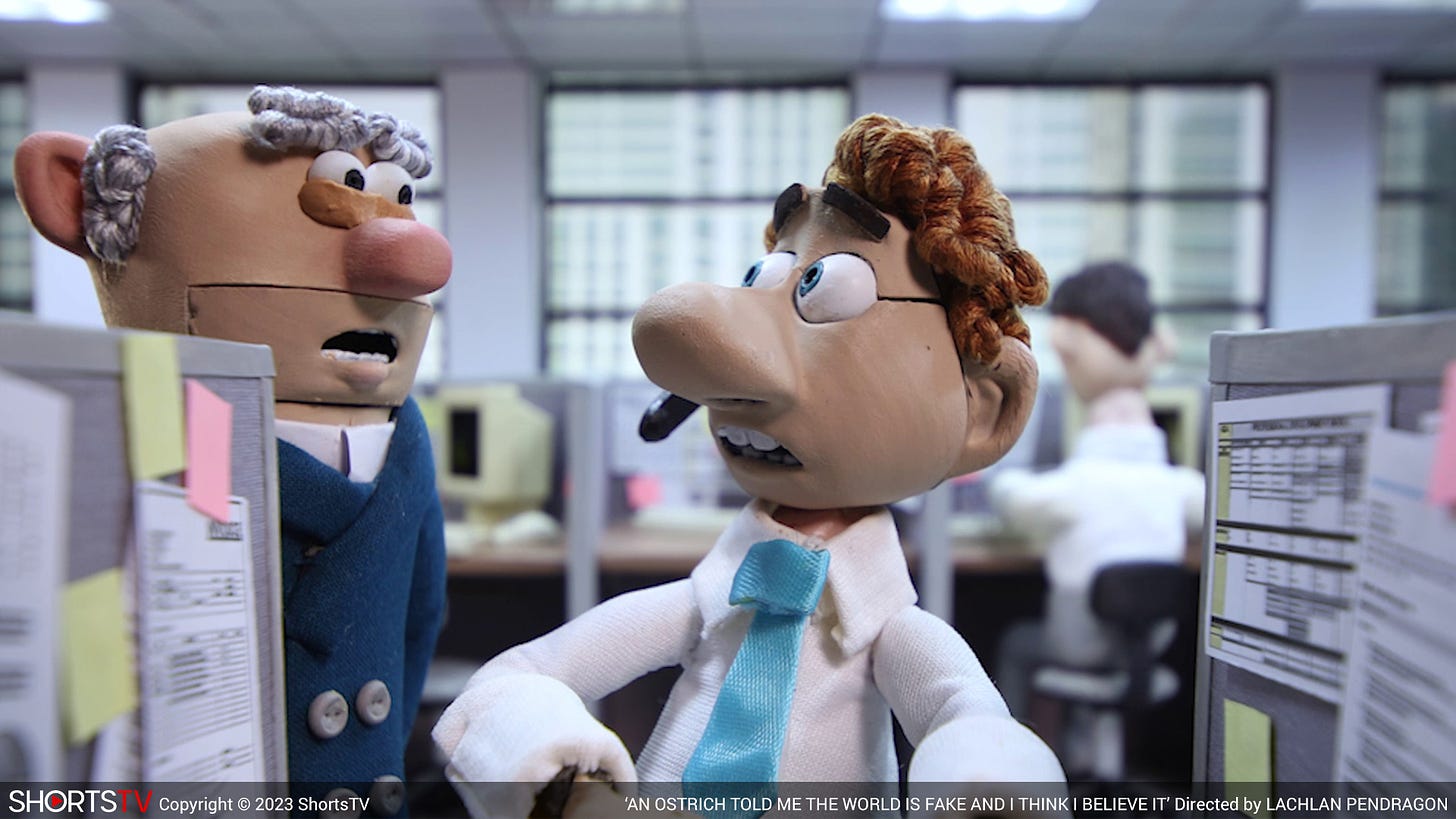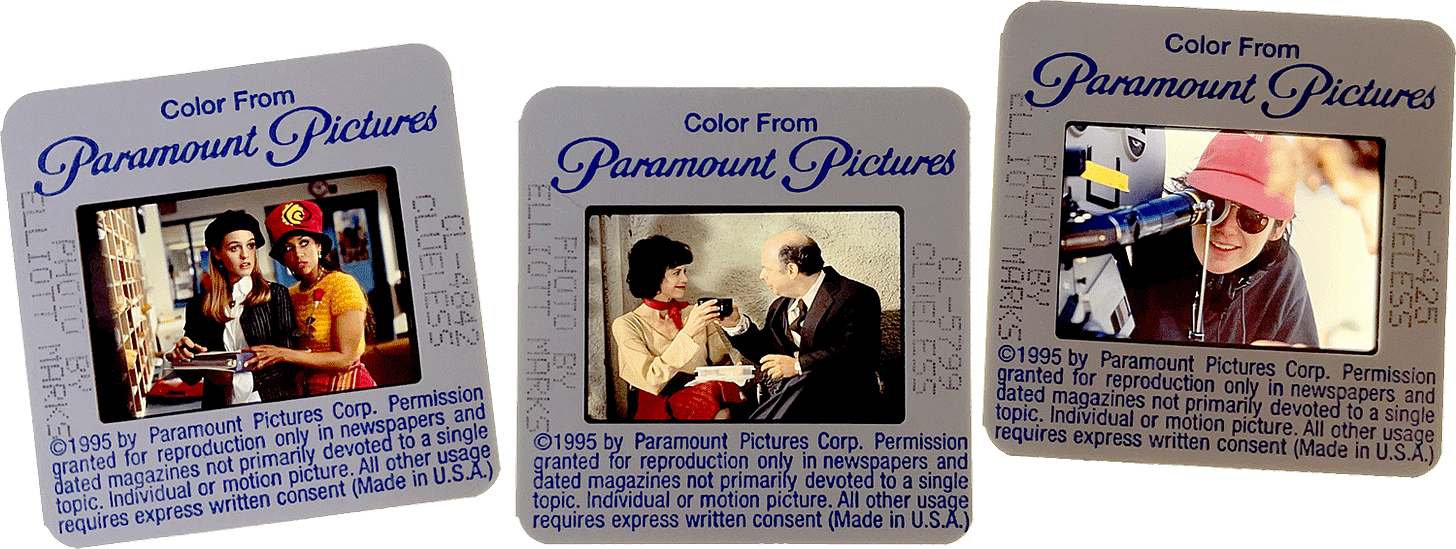It appears the death of the Elmwood and Transit Regals was exaggerated. While still planned to close, they, along with many other locations across the country, keep kicking with pre-sales going forward as far as May. Indiewire had some updates that seem to amount to a game of chicken wherein Regal knows their landlords will have a difficult time turning the properties into anything else but another movie theater. So, why not try and renegotiate the lease, save money towards the bankruptcy, and still try to turn a profit? We’ll see how long it lasts.
Sadly, as you’ll see by only seven reviews below, watching and writing about all fifteen Oscar Shorts took up more time than I anticipated. So, no catching up on Oscar features at all yet. My plan is to watch HOUSE MADE OF SPLINTERS today, though. And then I may skip a bunch of the 2/24 release titles on my calendar to knock a few more nominees out instead.
Then I’ll just need to decide if I should watch the original CHILDREN OF THE CORN (it’s on Prime and Shudder) before pressing play on the latest remake since it has already hit by inbox. I’m pretty sure I already saw it as a kid, but it apparently left no impression either way. (Not that I have much hope for the new one to do better.)
What I Watched:
88
(now in limited release)
There are a lot of familiar faces in Eromose’s 88, one of which belongs to Kenneth Choi. He only has one scene (and no name), but the dialogue shared between him and Brandon Victor Dixon’s Femi Jackson (the film’s lead) epitomizes exactly what this term-paper-turned-political-conspiracy-thriller delivers. Their conversation is meant to make audiences wriggle in their seats as hot button racial issues are thrown about in jest with a Black and Asian man comparing legacies of suffering with present-day danger. Rather than simply riffing, however, their banter becomes bogged down by an overwritten proselytizing. We are meant to learn something so profound that natural rhythm takes a backseat to verbosity. It’s exhausting.
It’s also constant. A conversation between friends? No. A lecture. An emergency office meeting? Lecture. If two people are on-screen, you can be sure they’re speaking to us rather than each other. So, why not make a documentary? There are multiple instances where Eromose brings in archival materials as evidence to lend credence to his dialogue. And anyone living in America as a self-described liberal knows the conspiracy at the back of this film is logically realistic if not unfolding as we speak. So, why mask it in fiction and risk turning its legitimate talking points into fodder for mockery? If I were to hazard a guess: Dinesh D’Souza. If Eromose presented this look at the white supremacist stranglehold on America as instructional (while still going this hard tonally), it would be dismissed as easily as D’Souza’s right wing propaganda.
That’s not to say 88 won’t anyway despite it calling out the system itself regardless of party affiliation. By centering on a Black family with obvious cause to question the world around them (cue more heavy-handed sermonizing, albeit with some visual and emotional panache when dealing with topics like teaching young Black children how to interact with police and becoming part of the inherent bias against one’s own oppressed people) fighting against literal Nazis, however, you can’t avoid political bias. That’s where Orlando Jones’ Harold Roundtree enters. He’s a Black democrat running for President for whom Femi—the financial manager of his campaign’s largest super PAC donor—discovered an unbelievable hidden truth. Roundtree’s campaign, and maybe his entire life, has been secretly bankrolled by the “Crooked Cross” (a KKK equivalent, not the Slayer song).
Now we need a rudimentary education on super PACs, non-profits, and Citizens United to wrap our heads around what that means and how it could happen. Instead of following THE BIG SHORT’s example with fourth wall-breaking asides, we learn via more heavily overwritten dialogue courtesy of a recurring interview between Roundtree and William Fichtner’s Ron Holt and the on-the-ground fact-finding mission spearheaded by Femi and his financial blogger pal Ira (Thomas Sadoski). Less fun, more constrained, and always pivoting towards a new adventure in clandestine operations with nothing but a presidential candidate’s social security number and a can-do attitude. Add a baby on the way, uncertain allegiances with morality, and the underlying message that all politicians are crooked and all power corrupts (you don’t say?) and you quickly realize the endeavor is mostly hollow entertainment.
Despite that, though, I do think Eromose’s intentions are pure. The film is nihilistic in a way that projects its true intent insofar as reminding people that they are all that stands in the way of corruption while also exposing how taking back power through an already corrupt system is a fool’s errand built on false hope. Does he present solutions? No. Are his characters excited about the future they’ve helped/are helping bring to fruition. Definitely not. They’ve discovered their complicity—much like the film itself when calling out entertainment and news media as co-conspirators. So, I must go back to my question: Why put these ideas into a fictional thriller? It only sustains the chasm between conspiracy and reality to the point where the whole feels like a satire of its own earnest motives.
- 5/10
EMILY
(now in limited release; opens Buffalo on 2/24)
Rather than make a biopic, writer/director Frances O’Connor has created a fiction—one merging aspects of her subject’s life with the novel many consider one of the greatest ever written. It’s a trend that seems to be happening more and more lately with artists looking to honor the spirit and legacy of a person instead of historical fact. And why not? Documentaries and biographies exist to provide objectivity. EMILY exists for those who want more. Fans who cherish the words Emily Brontë put to page and yearn to experience a version of events that mirrors the world she created. Because maybe that’s how she saw her own. Think the likely apocryphal stories about Van Gogh being influenced by mercury and/or lead poisoning to the point where his paintings weren’t expressionistic. They were reality.
I’ve never read (nor seen an adaptation of) WUTHERING HEIGHTS, so I will have to go by what I’m told as far as a mysterious sense of the supernatural lingering in the background of its pages. I remember it in Cary Joji Fukunaga’s JANE EYRE (written by Emily’s sister Charlotte), though. And an early scene here where Emily (Emma Mackey) plays a guessing game with her siblings and their parrish’s new curate (Oliver Jackson-Cohen’s William Weightman) embodies it too. Have the Brontës been visited by a ghost? Or has Emily’s thrillingly electric imagination grabbed hold of the moment to stir something pure within her companions? It’s enough to confirm talk of her being the “strange one.” And for Weightman to wonder if something ungodly resides within.
That uncertainty colors so much of what O’Connor has created from the inevitable romance that sparks between Emily and Weightman to the volatile dynamic shared between siblings that can’t help mixing their immovable love with an undeniable jealousy (both with Fionn Whitehead’s brother Branwell and Alexandra Dowling’s sister Charlotte). They all want Emily to write even as her shy insecurities (courtesy of some of those same people telling her to grow up) push her to stop. Her father wants her to be a teacher, like Charlotte. Weightman wants her to find God. And as everything she cherishes begins to crumble before her eyes, she can’t help but wonder if they’re right. Maybe the time for storytelling has passed. One glimpse at her poems, however, can make even her most pragmatic detractors believers of her unparalleled talent.
EMILY is a gorgeous film—emotive, thrilling, and also quite charming whenever it pairs Emily up with another to wryly smile while others scowl at them. Mackey performs the role with an infectious energy that runs through the highs (drug use, sex, trespassing) and the lows (heartbreak, failure, and death). This is a young woman struggling to stand in the way of a societal and cultural tidal wave demanding conformity when the unique brilliance their pressure subdues via panic attacks is the exact thing that will ultimately have them applauding her as a genius. That she must endure so much pain and lose so much love to finally listen to her gift is a tragedy. But it pushes her forward. It inspires her voice. And, in this fictionalized iteration, ignites that same fire in sisters already thought lost.
- 8/10
THE INTEGRITY OF JOSEPH CHAMBERS
(now in limited release and on VOD)
“Hell is coming to breakfast.” Why Joe (Clayne Crawford) has chosen those words to be his mantra while readying to go deer hunting for the first time alone is unclear. It’s obviously not something he says often. His wife Tess (Jordana Brewster) wouldn’t mock him out for the sheer absurdity of the statement (“Is Hell the place coming?”) if it were. Joe is simply trying to pump himself up—hoping the more he tells himself he’s a capital-M Man, the more he’ll buy the lie that it’s true. He needs this now that the fear of a world imploding has broken his city-mouse insurance salesman down to the basest desire with which our patriarchal society has indoctrinated young boys from coast to coast. Do you have what it takes to protect your family?
THE INTEGRITY OF JOSEPH CHAMBERS reunites the embattled Crawford with writer/director Robert Machoian after 2021’s THE KILLING OF TWO LOVERS. If it weren’t for four pending titles on the actor’s IMDb page, I’d wonder if this relationship was all that remained of his career post-"Lethal Weapon" ouster. It really is a shame that so many celebrities wind-up showing their true selves to be unworthy of pity let alone their own talent because Crawford is very good here in what amounts to a figurative one-man show. From the moment he leaves home until a final scene introduction of Jeffrey Dean Morgan, it’s just Joe in the wilderness. All his bluster, anxieties, stupidity, and hubris.
So much so that Machoian can have fun with the sound design to put us inside the character’s head. Because it’s one thing to laugh as he drops bullets and fails to secure the clip to his borrowed rifle. It’s another to watch long takes of his ineptitude conclude with piped-in applause when he somehow achieves a goal as small as finding the tree stand on his friend’s property and climbing up to settle in for a long day of waiting … and sleeping. Between these comic gestures for the audience and the inevitable voices that soon haunt his every waking minute, the point of the narrative comes through crystal clear: accept your limitations. That’s not to say you shouldn’t expand upon them, but do so intelligently and without fear taking the wheel.
The title ultimately teases what’s to come since fate can’t test Joe’s integrity by allowing him to shoot himself (although it often appears he will). No. He’s going to shoot something else and the consequences of that act will push him to the edge of morality for self-preservation. While Crawford and Machoian do effectively mine the emotional and psychological toll such tragedy demands, the long takes can get tiresome. I get the desire to showcase performance and highlight Joe’s internal tug-of-war, but redundancy does set in. Thankfully, that repetition serves an authentic series of mistakes and second thoughts leading to what one can only be described as catatonic shock. Because what’s more believable than that? No words or excuses can justify preventable violence by the hands of a stubbornly naive pretender.
- 6/10
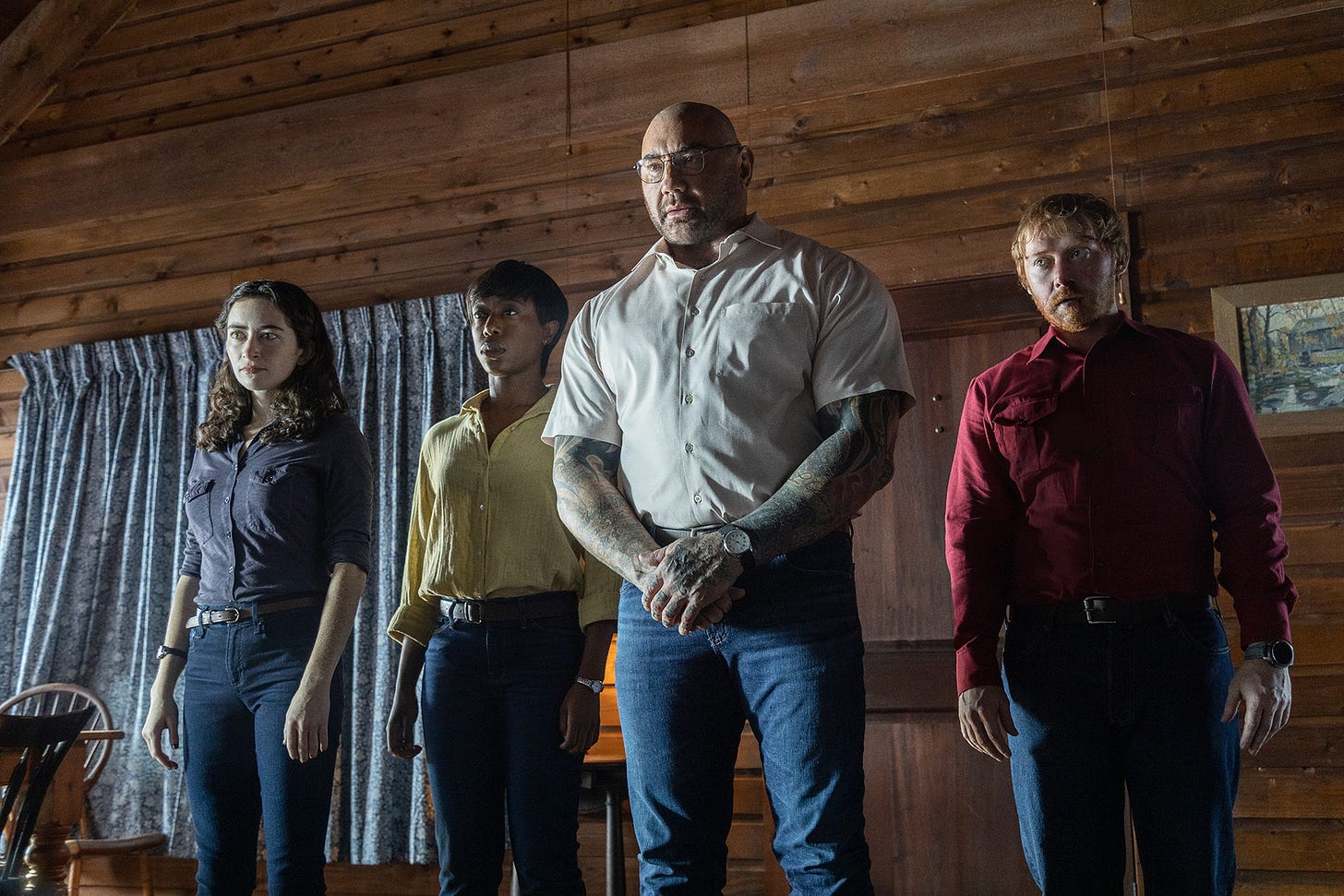
KNOCK AT THE CABIN
(now in theaters)
Considering “morality tale” M. Night Shyamalan is my favorite M. Night Shyamalan (I think THE VILLAGE and LADY IN THE WATER are his strongest films), I probably shouldn’t be surprised KNOCK AT THE CABIN enters that upper echelon of his oeuvre. I honestly think a lot of it comes down to his directorial prowess in such claustrophobic spaces whether they be physical settings or emotional anguish. Everyone was all about his scripts early on and their “twists,” but I have always thought he was a much better visual stylist. The blocking in THE VILLAGE is next level and he’s giving it a run for its money here. Because we don’t need to see everything that’s happening. It’s enough to experience the horror of those who did and the reality that they’ll never forget.
Based on Paul Tremblay’s THE CABIN AT THE END OF THE WORLD, Shyamalan ultimately rewrote the adaptation that Steve Desmond and Michael Sherman saw reach Black List status. It concerns a secluded family vacation in the woods with Eric (Jonathan Groff), Andrew (Ben Aldridge), and the seven-year old adopted daughter Wen (Kristen Cui). With her dads lounging on the deck, Wen goes out to catch grasshoppers—not to keep as pets, but to scientifically document their movements in her notebook. That’s what she’s doing when Leonard’s (Dave Bautista) heavy footsteps come walking up their path. He says he’s a friend and disarms Wen to the point where she believes him right until his “co-workers” arrive. Leonard can only apologize, knowing what comes next.
The ask is simple: unless one of Eric, Andrew, and Wen is sacrificed by the hand of another within their trio, all of mankind will be destroyed in an apocalyptic fire. Simple yet unbelievable. What follows is thus a test of faith. Faith in God, technology, science, love, and countless other touchstones that make up a person’s identity and moral compass. The test always concerns contrasts and whether or not what transpires is a product of what Leonard and his three acquaintances (Rupert Grint’s Redmond, Abby Quinn’s Adriane, and Nikki Amuka-Bird’s Sabrina) believe to be true or a product of coincidence. And what will each side see and cling to (or ignore) in order for them to keep believing that they are correct?
What is more plausible? That Leonard and company are bigots who singled out a gay couple to terrorize or that they each had the same vision of their extinction and thus banded together to try and prevent it from being fulfilled? Can tying Eric and Andrew up to start their “conversation” be seen as an unavoidable consequence of the inherent fear this situation conjures or will it fuel their fire to mistrust and disbelieve everything they’re told? And what about the conviction that’s put on display? The violence that is wrought in the name of something even Leonard admits he can’t truly know for certain has just as much chance of turning its audience numb as it does opening their eyes to a “what if” demanding its own leap of faith.
The performances that Shyamalan coaxes out of his cast are extraordinary. And not just that of Bautista who has rightfully earned the majority of praise due to a career-best turn. It’s everyone. Even young Cui despite falling prey to some of the usual child-actor shortcomings. Amuka-Bird is devastating as the most skeptical of her own actions from the bunch. Aldridge is pure sanctimonious rage with very good reason considering the past that will soon be revealed in time-released vignettes throughout. And Groff will break your heart as a spiritual man (Andrew tells him it’s okay to pray via a flashback) and a man who has bought into the romantic notion that he belongs to a family that will not waver in the face of death.
That’s what they face now. Not because Leonard might kill them. But because they might have to confront a decision between killing each other or being killed by the plagues that may or may not have been unleashed by their refusal to accept this supposed duty bestowed upon them. Does some of it get heavy-handed in a Biblical sense? Sure. I don’t think it works otherwise, though. That sense of doom is necessary to move the needle. It’s necessary to show how dedicated and sorrowful Leonard and the others are about their task and how dedicated and fiercely protective Eric and Andrew are about their family. I won’t lie and say I didn’t brace for a whimper or cop-out or “twist,” but Shyamalan relents. He stays true to the message and has faith in its potency for believers and non-believers alike. Because the best ending here is neither happy nor sad. Just inevitable.
- 9/10
2023 OSCAR SHORTS
(now in theaters)
My full breakdown of all 15 nominees is at The Film Stage.
THE OUTWATERS
(now on VOD and streaming via Screambox)
The worst thing you can do with a found footage film is mistake the conceit for a first-person parallel. Yes, in some regards it is since everything comes from the perspective of the person holding the camera. But it’s more about what is seen and the premise that it all happened—you can’t capture the footage if it wasn’t there to be captured. So, while I applaud Robbie Banfitch’s decision to blur that line and document a “nightmare,” it’s difficult to wrap your head around the logistics. The idea is that seeing impossible things should become scarier simply because their existence on these memory cards confirms they happened regardless of that plausibility. What occurs instead—at least to me—was that its impossibility destroyed the illusion and rendered the whole meaningless.
Many others disagree. Obviously. No horror film has been talked about more lately than maybe SKINAMARINK. But I didn’t love that one either. What I will say about THE OUTWATERS, however, is that a lot of the imagery in the final hour does captivate. At least that which we can make out since so much finds Robbie Zagorac (Banfitch) shaking the frame in extreme close-up (the most unbelievable aspect of the whole is that this character is thought of as a good enough filmmaker to shoot his friend’s music video when he can barely keep his brother in frame for a throwaway video to send their mother). The sound design is top notch and the surreal sense of losing time and space is exciting. And yet there’s nothing to grab onto beyond vibes.
I cared nothing for the characters. I knew nothing about them besides that Robbie lives in LA (earthquakes!) and goes nowhere without his camera; Scott (Scott Schamell) is too cool to visit Mom; Michelle (Michelle May) is a singer mourning her late mother; and Ange (Angela Basolis) is an old friend on the east coast coming to California for the first time. They all head to the desert for the aforementioned music video shoot after almost forty minutes of forgettable minutiae courtesy of the opening intertitles explaining how the footage was “raw and unedited” (yay!). And, after a day of fun in the sun and a night of ominous noises, all hell breaks loose with the shadowy image of a figure upon the horizon holding an axe.
What follows from there is the reason we’re watching. Blood. Viscera. Intestine snakes. Doppelgangers. Sharp cuts to mysterious places. Flying? I like the fact that Banfitch calls back to the first two memory cards by mirroring events from happier times with a repeat drenched in red. And the sequence moving from tents to his mother’s house and back to the desert is truly unforgettable (by far the best ten or so minutes of the film). But there’s zero substance. It’s an escalation in attempts to induce fear and discomfort that seems to go on endlessly (this should have been eighty-minutes tops) with flashes of brilliance being left to languish amidst the mundane and/or indecipherable. But I can’t begrudge anyone for getting on its wavelength. It’s definitely an experience. Just not one for me.
- 5/10
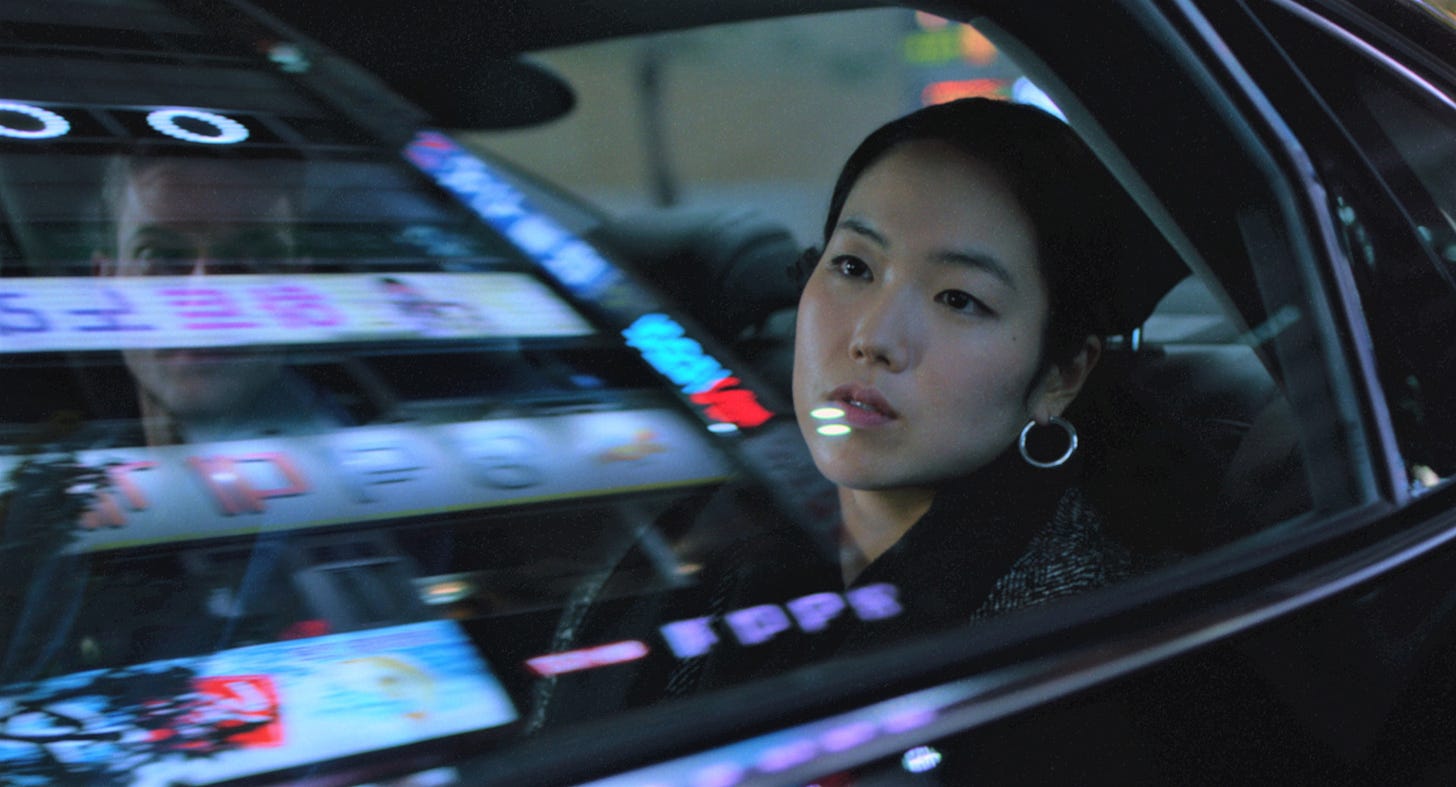
RETURN TO SEOUL [Retour à Séoul]
(now in limited release; Cambodia’s International Oscar submission)
Freddie (Park Ji-min) had no thought to find her biological parents upon arriving in South Korea. She had no inclination towards visiting her birth country at all. It was fate in a way—her two weeks of vacation, desperation to escape France, and cancellation of all flights to her original destination of Tokyo merging to place her exactly where the anger, confusion, and desire a twenty-five-year-old possesses would prove most volatile. So, she visits the country’s giant adoption complex and agrees to let them send telegrams to her biological parents in the hopes of receiving a response. What she uncovers isn’t quite what she imagined, though. And her rebellious nature takes control.
Davy Chou’s RETURN TO SEOUL is an emotional piece spanning multiple years and visits to allow petulance, hindsight, and maturity to color each vignette differently. There’s a sense of entitlement and rage boiling over during that initial trip. Maybe it stems from frustration with her adoptive parents. Maybe it’s simply a product of feeling lost and confused as a Korean-born, French-raised woman. She unsurprisingly rejects the more traditional culture presented in Korea, refusing to even consider that she should perhaps try to understand them since she is the stranger. But they’re to blame for that, right? Why should she compromise herself to cater to their guilt and regret?
The answer is simple in theory (politeness), but complex in action. Yes, Freddie sets this chain of events in motion by contacting the adoption agency, but how it plays out is totally outside her control. So, of course, she seeks to change that dynamic. She’s more than happy to sabotage everything as long as it grants her the power of superiority. They sent her away. They abandoned her. Now she gets to call the shots. She gets to punish them. While justified, however, it’s also counterproductive towards her goals. Freddie must therefore reinvent herself again and again to earn that control in other ways. To learn Korean, live and work in Korea, and consciously choose to leave it behind (or not).
It’s a stunning performance from newcomer Park. She’s moving between youthful pleasure, jaded anarchy, zero tolerance abstinence, and multiple career paths that put her in proximity to being better than her origins despite always maintaining a seemingly insurmountable distance from living a life she wants for herself as opposed to one built as a “fuck you” to the past. We move fast through her ever-changing phases from student to polyamorous globetrotter to weapons dealer, always resenting her biological father’s (Oh Kwang-rok) self-pitying nature in doing too much to be in her life while praying that her biological mother will provide answers despite never responding. That’s life, though. Needing what we can’t have while disavowing what we do.
In the end Freddie becomes an abandoner too. Chou passes no judgment, though. She should be able to live her life as she pleases. But the choices she makes have consequences just like the ones her parents made did. This journey is less about forgiveness or hate than it is acceptance. Acceptance for her past, present, and future as well as the role she plays in all three no matter what externally unfair hand she might have been dealt. Is Freddie Korean? French? Both? Is she an opportunist, drunk, vegetarian, or abuser? All the above? People change. People evolve. The question is whether you’re willing to stick around and be vulnerable enough to see what emerges next. Some cocoons are a lot more daunting to construct than others.
- 8/10
SHARPER
(now in limited release, including Buffalo, and streaming on AppleTV+)
I wonder if Brian Gatewood and Alessandro Tanaka’s script should have inspired director Benjamin Caron to use a different definition at the start of SHARPER. You can’t begrudge the obvious choice considering the title is synonymous with con artist, but I do think the better term is “irony.” Because it’s one thing to play a con on the audience and another to constantly play one on every single character on-screen—each a thief. One swindler swindles another until it becomes less about the drama of how they do it and more about whether the latest victim can put their money where their mouth is. Because Max (Sebastian Stan) always says, “You can’t con an honest man.” So, if you’re not allowed to pity your mark, you also can’t pity yourself upon discovering you were it.
That unfortunately means the movie itself loses a lot of its luster after chapter one. I really liked that first segment, though. It portrays the blossoming love affair between Tom (Justice Smith) and Sandra (Briana Middleton). He manages a bookstore. She’s a PhD student. They both have endured the death of a parent, the uncertainty of adulthood, and the pain of being made to feel insufficient by someone they love. And yet we know from the start that it’s all too good to be true. We don’t know why until more details are revealed with which to figure out motive, but that sense of fabrication always looms large—partially because we’ve read the synopsis and partially because the actors toe the line between trust and transparency very well. Right until the other shoe drops.
Next we meet Max. Then Madeline (Julianne Moore) and Richard (John Lithgow). I won’t go into who they are considering they’re each one person via intentional preconceptions and subterfuge before being shown to really be someone else with a quick tug of the rug. So, while each chapter is labeled with a character’s name, they actually introduce the next character’s initial identity as they expose the previous one’s true identity. Aggressors become victims and victims aggressors as the non-linear vignettes push us forward with just the right amount of information to put the pieces together. Caron and company may have calibrated things too perfectly, though, since it’s impossible not to be one step ahead from pure pattern recognition alone. Tidy cycles lack surprise as a rule.
Enjoyment is therefore in the eye of the beholder. I personally don’t mind knowing where things are going as long as the path is authentically portrayed with interesting characters I can invest in. SHARPER delivers for most of its runtime (the climax is ultimately a hastily wrapped up and obvious last hurrah), so I must admit I was satisfied by the experience. But you’d have to be willfully ignorant not to understand why others wouldn’t since the plot brings nothing new to the table with a progression that rarely holds real stakes. Caron is providing a ride aimed at mainstream audiences who’ve agreed to give themselves over fully to the moment. I’ll liken it to a CBS procedural. The station often wins the ratings game with mediocrely bow-tied programming. It won’t impress anyone, but it’ll do its job.
- 6/10
Cinematic F-Bomb -
Kate Hudson going all-in on the f-bomb in SOMETHING BORROWED. (Substack apparently can’t handle an embedded gif, so you’ll have to click over for a smoother experience. Or see everything at cinematicfbombs.com.)

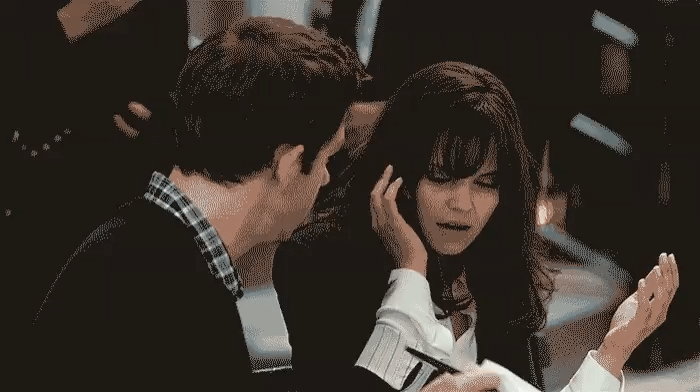
New Releases This Week:
(Review links where applicable)
Opening Buffalo-area theaters 2/17/23 -
ANT-MAN AND THE WASP: QUANTUMANIA at Dipson Amherst, Capitol Theatre & Flix; AMC Maple Ridge & Market Arcade; Regal Elmwood, Transit, Galleria & Quaker Crossing
CORSAGE at North Park Theatre
“It's a lively enterprise that goes beyond historical fact to capture a prevailing attitude instead. It's not about what Elisabeth did, but why she had no choice but to do it.” — Full thoughts at HHYS.
CROUCHING TIGER, HIDDEN DRAGON at Dipson Capitol Theatre
FULL TIME at North Park Theatre
MARLOWE at Dipson Capitol Theatre & Flix; AMC Market Arcade; Regal Elmwood, Transit, Galleria & Quaker Crossing
SHARPER at Dipson Amherst
Thoughts are above.
2023 OSCAR NOMINATED SHORTS at Dipson Amherst
My full breakdown of all 15 nominees is at The Film Stage.
Streaming from 2/17/23 -
J-HOPE IN THE BOX - Disney+ on 2/17
SHARPER - AppleTV+ on 2/17
Thoughts are above.
10 DAYS OF A GOOD MAN - Netflix on 2/17
UNLOCKED - Netflix on 2/17
THE STRAYS - Netflix on 2/22
CALL ME CHIHIRO - Netflix on 2/23
Now on VOD/Digital HD -
CHILDREN OF THE MIST (2/14)
FRAMING AGNES (2/14)
INFINITY POOL (2/14)
JETHICA (2/14)
“Seeing how Ohs and company achieve [their] success on a small indie budget while subverting genre conventions might be worth having to sit through [a rather egregious] blunder.” — Full thoughts at HHYS.
MAYBE I DO (2/14)
PROJECT WOLF HUNTING (2/14)
“The whole works on a level of pure [bloody] entertainment alone, but the gradual introduction of backstory and motivations definitely does add another gear.” — Full thoughts at HHYS.
RAQUEL 1:1 (2/14)
REMEMBER YESTERDAY (2/14)
SIGNIFICANT OTHER (2/14)
SWALLOWED (2/14)
“I was really vibing with the film for the first half of its runtime. It's tense and mysterious [before ultimately becoming] a prolonged survival film as [the Boss] and Benjamin play cat and mouse to familiar ends.” — Full thoughts at HHYS.
HUESERA: THE BONE WOMAN (2/16)
“Huesera is a psychological thriller dealing more with the myriad uncertainties that have ravaged Valeria's life. Cervera and co-writer Abia Castillo are breaking Valeria down to build her back up.” — Full thoughts at The Film Stage.
CAT DADDIES (2/17)
THE CIVIL DEAD (2/17)
“It can feel a bit long at times, but I don't think the filmmakers ever overextend the joke. It helps that they acknowledge the darker places inherent to the conceit.” — Full thoughts at HHYS.
THE INTEGRITY OF JOSEPH CHAMBERS (2/17)
Thoughts are above.
THE OTHER FELLOW (2/17)
THE OUTWATERS (2/17)
Thoughts are above.
A RADIANT GIRL (2/17)
THE WEAPON (2/17)





